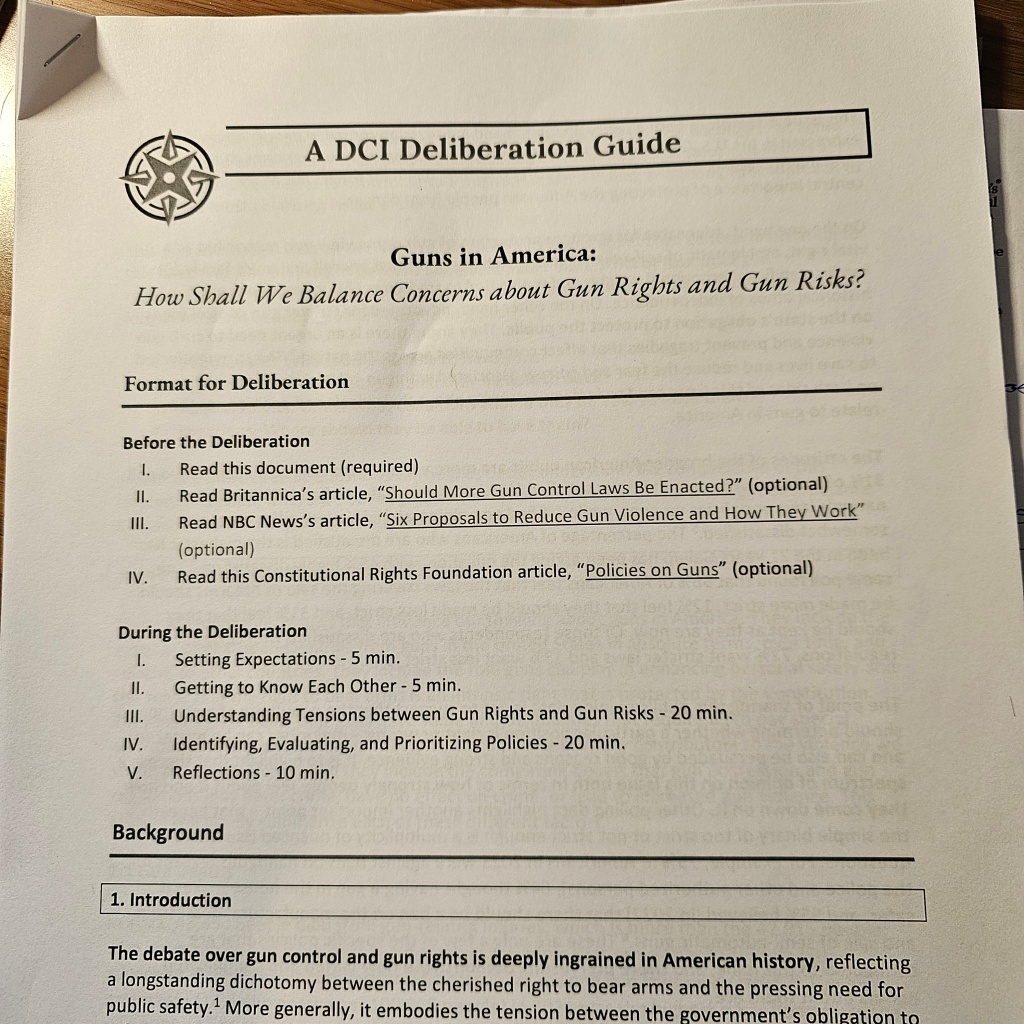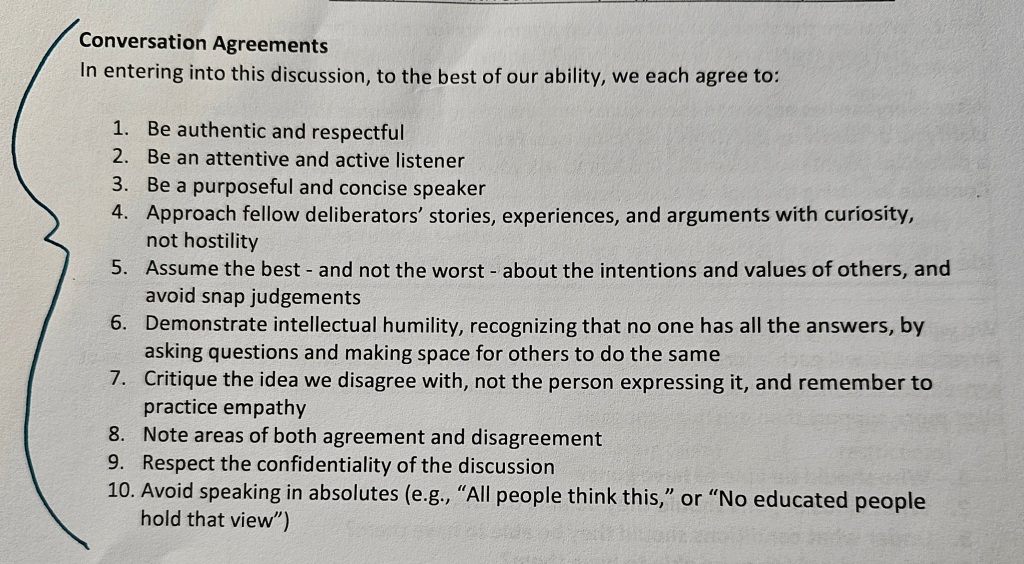Last week I attended a Deliberative Forum on “Guns in America: How Should We Balance Concerns about Gun Rights and Gun Risks?” at Davidson College, a fine liberal arts institution down the road from Wake Forest. I only learned of the Tuesday night event on Monday morning when Philip Smith, President of the National African American Gun Association, emailed me to let me know he would be in North Carolina the following day. I eagerly registered for the event and made my way to Davidson immediately after class.
The event was developed by something called the Deliberative Citizenship Initiative at Davidson College. According to their website, “The purpose of the Deliberative Citizenship Initiative is to create opportunities for Davidson students, faculty, staff, alumni, and members of the wider community to productively engage with one another on difficult and contentious issues facing our community and society.”
I was not familiar with this initiative prior to the forum, but it certainly fits with my desire to see people have brave and empathetic conversations about guns.

The forum was two hours long and broken into two parts. One hour consisted of a panel discussion moderated (well, in my view) by Davidson history professor Dan Aldridge. The second hour involved group discussions at our tables moderated by Davidson students.
The panel discussion had the virtue of being civil, but for someone who has toiled this land for over a decade, the insights were more limited than I had hoped. This was due, in part, to the selection of the panelists, two of whom were “scholars” and two “practitioners” (my characterization, not theirs).
Of the scholars on the panel, one was erudite but aloof, and the other was amused that he was even invited, given his current work outside the gun arena. Neither is seriously invested in advancing a conversation on the issue of guns in America.
The two panelists who came out of practice, by contrast, gave the greatest insights because they are seriously invested in the issue and have experience on the front lines of the reality of guns in America.
I was told the panel was recorded and will add a link here if one becomes available.
A 24-page deliberation guide was distributed ahead of time. Because I registered last minute I did not see it until I sat down for the event. Skimming it, I think it does a pretty fair job of trying to set up the question the forum was answering in a balanced manner. I could actually see a version of this document being used for a weeks-long, ongoing engagement with the question.
As it was, our table was hard-pressed to delve deeply into deliberation parts III (understanding tensions between gun rights and gun risks) and IV (identifying, evaluating, and prioritizing policies) in just 20 minutes each.
That said, I found our table discussion interesting. We had 3 Davidson College students and 3 members of the community (and me). One community member was a retiree who was concerned about guns and wanted to know more. Her humility in recognizing that she did not really understand the issue was refreshing and I felt very empathetic toward her concerns about negative outcomes with firearms. The other two community members were a woman who had run as a Democratic candidate for the NC House of Representatives and her husband. She had strong opinions about the gun issue, not surprisingly, and her husband echoed those.
In the deliberation guide we received was a set of “conversation agreements” that we read around the table prior to jumping in. I thought these were excellent and I may use them or some form of them in my Sociology of Guns seminar at Wake Forest this fall.
The Democratic activist at our table led the way, and although she didn’t violate the conversation agreements, per se, her approach was more didactic than inquisitive.
The students, by contrast, did well to express their deeply felt concerns. One student was an education major at Davidson and spoke worryingly about armed teachers in schools. Another student questioned whether her 18-to-20-year-old classmates were mature enough to own firearms.
The third student was from Nepal. Being the least familiar with American society generally, he made one of the most interesting points of the night. He thought it would be much cheaper to address the underlying causes that drive people to want guns for self-defense in the first place than to deal with the negative outcomes that result from widespread gun ownership by people who live in vulnerable circumstances. (Here he was responding in part to points Philip Smith made about why some African Americans own firearms for self-defense.)
This rang familiar to me as a liberal gun owner who favors “root cause mitigation” (see Liberal Gun Club on this). Unfortunately, I had to break the bad news to this Nepalese student that, as a society, the United States has not always committed to making the kinds of social investments that would reduce negative outcomes with guns, including suicide, homicide, and mass public shootings.
All-in-all, I’m glad I invested 5 hours after a long day of work to attend this forum. It gives me hope that carefully crafted conversations can produce light over heat on the issue of guns.
And it also reminded me that even a spontaneous or ad hoc conversation that takes place face-to-face has more potential than people arguing with each other on social media.



Thank you professor, very appreciative of you to take much time and energy to jump into this conversation once again.
Looking forward to that recorded convo / discussion, if the moderators grant permission.
LikeLike
Dr. Yamane, it seems you’re able to attend a fair number of academic discussions of gun rights policy. Have you ever witnessed discussion of the negative effects of restrictions on possession by private citizens? I specifically refer to macro problems like genocide, democide, ethnic cleansing, slavery, colonial exploitation, invasion, and terrorism. A current example of social costs of restrictions is the casualty count and material destruction of the ongoing war in Gaza. Israeli law prohibits private possession of rifles and severely restricts handgun and ammunition possession. The October 7 attacks could not have succeeded had the target populations possessed rifles similar in type and number to those found in typical US towns. The same applies to the Palestinian population; Hamas’ monopoly on weapons made effective popular defense against Israeli forces impossible.
Many Americans buy firearms because we are aware of the long historical record of the mistreatment of poorly armed groups by the better armed.
LikeLike
I have seen this argument made in writing but never witnessed a discussion of the issue. Would be interesting to see a debate on it.
LikeLike